In the not-too-distant past, I was reading one of my fictional stories to a friend. He stopped me within the first paragraph and asked a very simple question, “What are you trying to say?”
Not as in, what was I trying to say in the story, but rather, what was I trying to say as a writer? And I . . . didn’t have an answer for him. He further explained that some of his favorite authors were always trying to convey one particular message or theme in their various works—no matter how disparate.
J.R.R. Tolkien used The Lord of the Rings as a playground for his knowledge on languages, and as an allegory for the horrors of war. Robert Jordan used The Wheel of Time as a way to cope with PTSD. Whether they intended to or not, authors tried to say something in their writing. But I had no clue what it was I was trying to say.
Shortly after that, I found myself pouring over some of my old tea haikus. (Yes, I did some of those.) And I ran across this little forgotten “gem”:
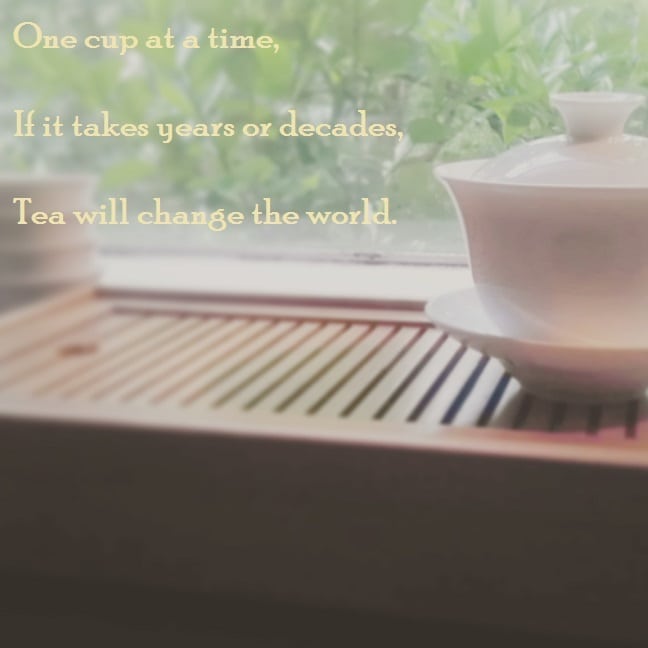
A pretty tall claim, even for a haiku. However, it made me wonder, Was that my message? If so, it was an unabashedly optimistic (and ambitious) one. As I gave it more thought, the more it crystalized. Yeah . . . that was my message.
Tea will change the world.
Perhaps I should explain.
In a story I have yet to write, I have a character that has a catchphrase . . . in a very cartoonish Russian accent, “Tea will change the world, you will see.”
Other characters in the story scoff at his claim, but as the story unfolds, it becomes clear that tea—whether by accident or design—is at the precipice of every major global talking point. Yes, all of them: The environment, the global food supply, agricultural practices, territorial conflicts, trade, and even more domestic issues, like race relations. Tea can—and/or already does—play some small part in all of it.
Back in October, I attended two talks given by the same tea estate manager. He had a simple, if nutty, declaration, “You want to end global warming? Everyone on earth should plant a tree. What are there, seven billion people? There you go; seven billion trees. Global warming, over.”
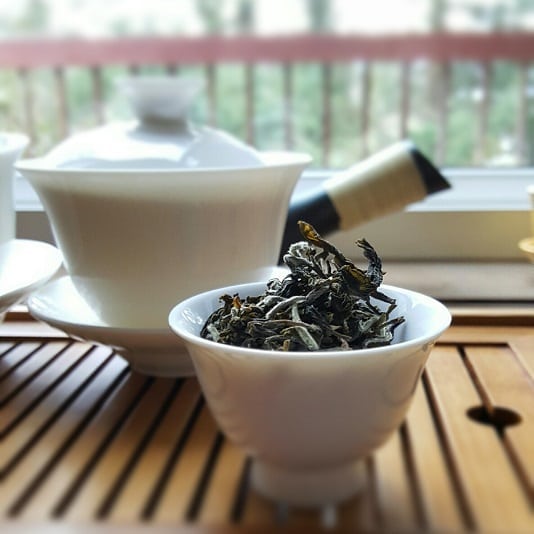
Black tea from Darjeeling, West Bengal, India
I’ll admit, I laughed off the notion, but then I steeped in that thought. Sure, the unlikelihood of getting seven billion people to plant anything was far-reaching, but getting them to do something to curtail climate change wasn’t improbable. Many news outlets and scientific journals profess that the end of the world is nigh, but few offer up concrete solutions. A simple plea of, “Please recycle,” isn’t enough.
For the most part, I ignore these articles, unless I see similar inferences made in tea publications. Extreme weather, drought, and other climate catastrophes greatly affect the output from tea gardens across the world. Less rainfall equals less output; too much rainfall also equates to less crop. Ever-changing environmental conditions brought upon by manmade means greatly impact agricultural products that the entire world depends on. And where tea gardens are the first to be affected, they may also be the first to offer a solution.
While I’m still on the fence regarding biodynamic agriculture as an ideal model, other gardens have taken the best parts of those theories and put them into practice. Sustainable gardening innovations that started in tea gardens are also being adopted by other farmers of other crops—and vice-versa. I believe that tea growing is—and could continue to be—a leader in this development. The same applies to tea production.
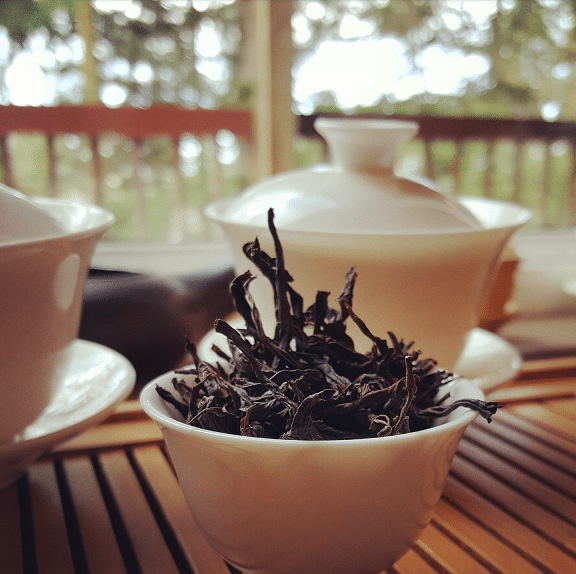
Black tea from Colombia.
I one time declared that the old tea plantation model was on life support; I still stand by that statement. When it comes to production, tea is both an innovator and an outdated/outmoded hold-out of a bygone era. Many parts of the world still employ thousands of tea planters, pickers and producers at a pittance of an income. I won’t go into detail about this, for it is already an issue many are aware of. I can say, I do see a change taking place. Not just without the plantations, but within.
Collective farming is on the rise, cooperative factories are becoming more commonplace, and the incorporation of mechanization are gaining ground (albeit slowly). Tea is a labor intensive process, from farm to factory to cup. For it to remain a cost-effective product, corners need to be cut, but without sacrificing artistry. I find it fascinating that—in order to do this—some growing regions are looking past their borders for inspiration. China looks to Japan; India looks to Nepal (and vice-versa), Thailand and Vietnam look to Taiwan. And while there is some hesitance to this global cross-pollination of tea traditions, the early results seem to be fruitful.
Which brings me to the sellers . . .
The tea industry, as a whole, has been around for centuries, but it has gone through many transformations in that timeframe. What once started as a global trade of mediocre goods to the masses—and top tier products for the rich and powerful—has changed to something more egalitarian. Sure, there are still teas out there that only the affluent can afford, but the option is at least available to the hourly-waged cupper as well.
When it comes to wholesaling and vending these wares, the tea industry also shows itself to be unique in one peculiar way. Instead of it being a hotbed of capitalistic posturing or cutthroat marketing, the industry works best when everyone talks to each other. When everyone is allowed to carve out their own niche. I’m not saying it’s like that everywhere, currently. (Trust me, I’ve seen a few metaphoric throats slit in the tea industry.) But the industry benefits from a more . . . well-mannered form of competition.
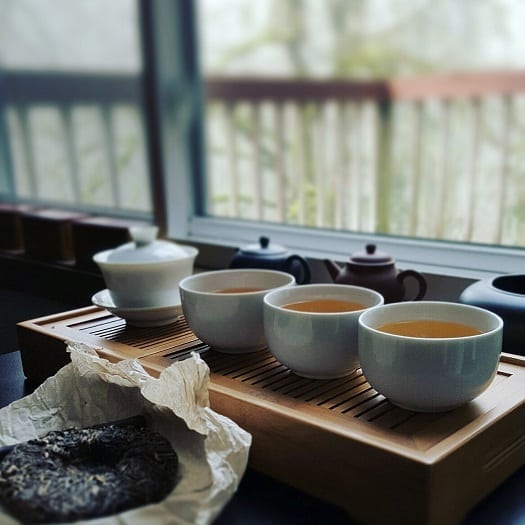
Sheng puerh from Yunnan province, China.
As an example of this, one need not look any further than Seattle. There are countless tea merchants, wholesalers, buyers and bloggers in the Jet City. I’m not sure how it happened, but they all seem to have no problem talking to one another. Everyone knows everyone, and everyone has their niche. Sure, there are conflicts here and there, but overall, everyone has their corner of the sandbox . . . and all are allowed their own plot of sand. I can’t even name one other city where this dynamic exists. Not even in Portland (my home base).
I think the industry as a whole could operate like that. Wholesalers and vendors could all just . . . talk to each other, share their stories, carve out their own corner of the industry, and be left to their devices. Such transparent communication could, in theory, allow for less toe-stepping. Such evidence of this is out there.
And such competitive conflict resolution could affect the global political stage as well . . .
After yet another news report about yet another global crisis (of which there’ve been many), my mother said this, “World leaders should all get together and have tea. No one wants to kill each other after having tea.” Again, a relatively simple solution to a complex set of problems . . . but at the same time, brilliant.
Three of the biggest “adversaries” to the United States (presently) are Russia, China, and the Middle East (yes, all of it). What do these three regions have in common? They are awash in tea. Russians go nuts over Ceylon and puerh. I don’t even need to go into China’s connection to tea. And the greater Middle East? Well, summits of great import are convened over tea as a tradition. In fact, the only major power that doesn’t utilize tea as tool for diplomacy is the United States.
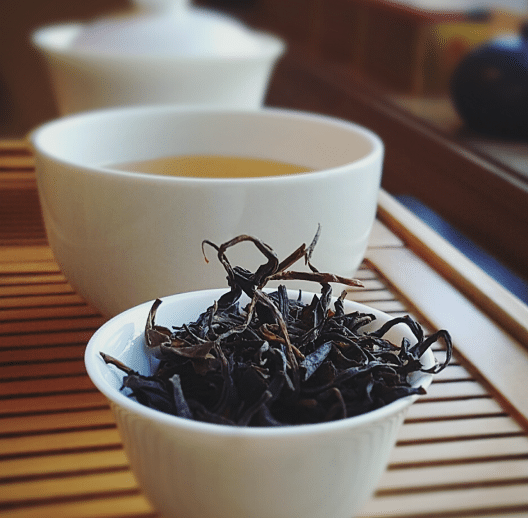
Oolong from Russia.
Could a Global Tea Summit be a solution? A place where everyone meets over a fine array of aged oolongs and just buries the hatchet? With the world trending towards nativism, anti-globalism, populism, anti-trade and isolationism—a chaotic climate I’ve never seen in my lifetime—perhaps the answer is that simple. One cannot remain ignorant of their perceived enemy once they’ve shared tea.
This is even true on a smaller, more personal scale, which I can attest to.
Before taking up tea as a hobby, I will confess to being very ignorant and uninformed of people from other cultures and creeds. I pretty much stayed within my homogenized bubble, rarely branching out to broaden my horizons. No, I did not seek to demonize anyone, but I didn’t try to earn their friendships, either. Because of tea, my bonds have diversified. People I’ve shared tea with are Christian, Muslim, Jewish, Hindu, Buddhist and atheist. I’ve extolled the virtues of white tea with black women, and gushed over black tea with white men. From my cup, through leaves swimming in water, I’ve shared with the world.
Tea changed my world.
So . . . yes . . . that is what I want to convey as a writer. Tea will change the world. I believe that wholeheartedly. And I will do my small part—with my small writing voice—to help tea change the world.
Until the day it does.
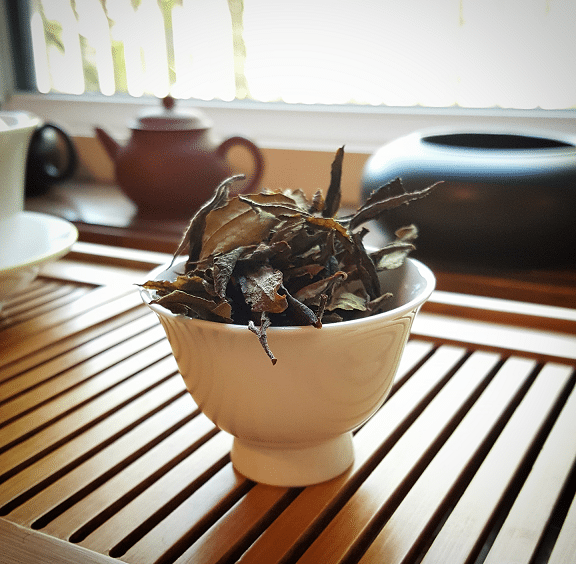
White tea from the United States.

riccaicedo
Great post!
I’m sure that tea will change the world.
lazyliteratus
If your blog is any proof.
Margo Hutchinson
Great beverage for negotiations! And you can just enjoy one cup at a time while we are all waiting! Folks are waiting for the second coming so what is the problem for waiting for something else?
lazyliteratus
Mom, that is the greatest comment, ever.
Lindsay D
As ever this is well written and if one can be so bold slightly contemplative. One supposes it is the time of year for reflection.
To further the thoughtful title isn’t the world (‘s climate) changing tea? If one remembers the old Chinese phrase “Grow tea now or 25 years ago” then these cold weather growers are a significant development for the future. That chimes with the Tea Research Association report of this year that concluded traditional areas being threatened by the same changes. In fact within the lifetime of all of us areas such as Assam and Yunnan are severely susceptible by 2050.
Clearly in the meantime that fact shouldn’t totally preoccupy all thoughts on teas and taste, However when one considers where tea has taken you and will continue to take you it’s interesting to know where it appears to be going.
Hopefully that fact isn’t too pensive
lazyliteratus
Not too pensive at all. Same thoughts I’ve had for awhile.
Anna @ The Tea Squirrel
I love the idea of tea and diplomacy and the optimistic outlook that shines through your post
lazyliteratus
Right!? It’s almost deceptively brilliant!
Xavier
Let’s all drink to this idea so that it might become true.
lazyliteratus
Here, hear!
Lord Devotea
YOU will change the world.
lazyliteratus
That’s a tall order.
Nicole
This post is a slightly unexpected but very welcome nugget of hope. Tea has definitely changed my world for the better. I think it can do the same for everyone else too.
lazyliteratus
So do I.
Notes on Tea
It’s definitely changed the world before so raising my cup of tea to a better world. Thanks for writing so beautifully.
lazyliteratus
I should’ve probably said “change the world for the better” . . . but I assumed that was implied.